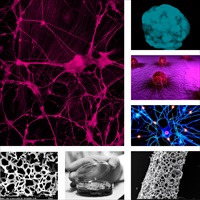Channels
Special Offers & Promotions
3D Cell-Based Models for Regenerative Medicine & Drug Discovery
Presented by Dr Elad Katz, a senior scientist at AMSBIO, a new on-demand webinar explores the potential of 3D cell-based models for regenerative medicine and drug discovery.
 Two-dimensional (2D) cell cultures have provided a number of breakthroughs for understanding human tissues and diseases, as well as for discovering and testing new drugs. However, 2D cell cultures have limitations, such as limited cell-cell and cell-matrix contacts, flat cellular morphologies and a lack of realistic mass transfer gradients. As a result, technologies that facilitate growing cells in three-dimensional (3D) configurations have been developed to make cellular behaviors in vitro better resemble the body.
Two-dimensional (2D) cell cultures have provided a number of breakthroughs for understanding human tissues and diseases, as well as for discovering and testing new drugs. However, 2D cell cultures have limitations, such as limited cell-cell and cell-matrix contacts, flat cellular morphologies and a lack of realistic mass transfer gradients. As a result, technologies that facilitate growing cells in three-dimensional (3D) configurations have been developed to make cellular behaviors in vitro better resemble the body.
In this recorded webinar, Dr Katz assesses the impact on the physiological relevance of in vitro cell based models using traditional ECM proteins, alvetex scaffolds and low adhesion plates in drug discovery and disease modeling applications. Highlighting examples including oncology and stem cell culture, Dr Katz demonstrates how the different 3D technologies that AMSBIO provides can help researchers to successfully perform the applications they need. Drug discovery considerations such as suitability for high-throughput screening are discussed in detail.
Founded in 1987, AMS Biotechnology (AMSBIO) is recognized today as a leading company contributing to the acceleration of discovery through the provision of cutting-edge life science technology products and services for research and development in the medical, nutrition, cosmetics and energy industries. The AMSBIO range includes specialist antibodies, peptides and recombinant proteins. In addition the company is able to draw upon in-depth expertise in extracellular matrices to provide elegant solutions for studying cell motility, migration, invasion and proliferation. Widely acknowledged as experts in cell culture, AMSBIO partners with clients in tailoring cell systems to enhance screening outcomes and eventual prognosis. With a range of molecular detection reagents, and a significant Biorepository the company can also provide tissue DNA, RNA, protein and microarray products. Key research areas for these products include: Oncology, Regenerative Medicine, Environmental Analysis, Cytotoxicity Screening, Glycomics and Stem Cell Biology.
Media Partners


